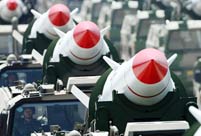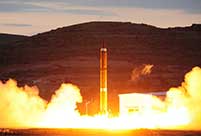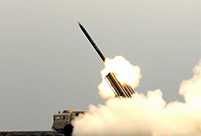

Without such a contract, the amount of crude oil Chinese traders demand would not be seen by the overall market, thus not contributing to determining the market price.
Johnson said the launch of the new Chinese crude oil contract will help increase trading volumes on the DME because the two contracts will help traders see arbitrage opportunities and execute trades to take advantage of the arbitrage.
Arbitrage means traders buy the cheaper contract and sell the more expensive one in order to pocket riskless returns, as the underlying commodity of the two contracts is often the same.
Johnson said because the Middle East is a big exporter of crude oil, the Oman Crude contract is now seen as a reference price by oil exporters, and as China is a big importer its crude oil contract is likely to be seen as an import reference price.
"The fact that our contract is priced in dollars and the Chinese contract is priced in renminbi (yuan), and that one contract is an export benchmark and the other is an import benchmark means that our two prices will never be the same. The arbitrage opportunity will increase trade volumes," he said.
Historically, Brent crude contracts worked as export contracts and the WTI an import contract, and the relationship between the two has been a key influence on driving up trade volumes.
Launched in 2007, the DME is a subsidiary of the United States-based futures company CME Group (Chicago Mercantile Exchange & Chicago Board of Trade). Johnson said a key objective for the DME's founding was the launch of an Asian crude oil benchmark that fills a gap in the market.
Johnson said the association with CME has greatly helped DME's growth, as CME has provided his team with its own trading platform technology, so the DME would not need to invest heavily into infrastructure at its founding stage.
From there on, it established credibility with a consistent service to traders, which led to a gradual accumulation of liquidity.
Before, much of China's oil imports were bought over the counter, meaning individual companies would negotiate oil prices. Over-the-counter negotiations are much more complex than buying a crude contract on the DME, and given the lack of price transparency, junior traders often found it difficult to justify the purchase price to managers.
Although Brent and WTI are open to foreign participation, a key problem with the later is that the US-produced underlying crude oil cannot be taken out of the country, meaning it is purely a tool for financial speculative trading or crude oil purchases by US firms.
Brent crude, produced in the North Sea, is now seeing its volume decreasing, meaning the future sustainability of Brent exports faces uncertainty in the long term.
As much of the Asian markets' crude oil demand is already satisfied by the Middle East production, the launch of the Oman crude contract has fulfilled big demand in the market. Apart from Chinese buyers, oil companies from Japan, South Korea, Singapore and Malaysia are also buyers of Oman crude, together making up about 30 percent of total trade.
Furthermore, the DME has focused heavily on physical delivery of oil by making sure the futures contracts match the physical delivery of the underlying crude, and this fits well with the Chinese government's objective to encourage the use of commodity trading for physical delivery as opposed to speculative trading.
This characteristic distinguishes the contract from the other crude oil exchanges, where a large volume of the trade is focused on the profit or loss at contract expiry, rather than the commodity changing hands.
 |
 Indomitable Chinese people during WWII
Indomitable Chinese people during WWII
 Awesome Chinese missiles
Awesome Chinese missiles In pics: shocking aftermath of Tianjin blasts
In pics: shocking aftermath of Tianjin blasts
 Striking moments when strategic missiles are launched
Striking moments when strategic missiles are launched Construction on Asia’s biggest suspension bridge started
Construction on Asia’s biggest suspension bridge started Impressive firing of China’s rocket artillery system
Impressive firing of China’s rocket artillery system Shocking scenes found in 4000-year-old earthquake relic
Shocking scenes found in 4000-year-old earthquake relic Female soldiers add color to military parades
Female soldiers add color to military parades Mums stage breastfeeding flash mob
Mums stage breastfeeding flash mob Museum of nonsense
Museum of nonsense Tianjin explosion: Latest updates
Tianjin explosion: Latest updates Tianjin officials fumble to communicate
Tianjin officials fumble to communicate Blaze and glory: brilliant photos of China's mountain firefighters on the frontlines
Blaze and glory: brilliant photos of China's mountain firefighters on the frontlinesDay|Week